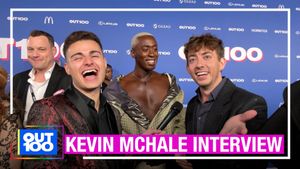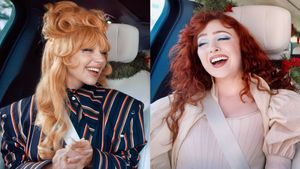On October 6, the
Nobel committee awarded half of the 2008 prize in
medicine to two French virologists -- Francoise
Barre-Sinoussi, 61, and Luc Montagnier, 76 -- for
their discovery of HIV in 1983. Their work spurred the
development of blood tests to identify HIV infection and the
subsequent creation of antiretrovirals, which have prolonged
hundreds of thousands of lives. Advocate.com talked
with Francoise Barre-Sinoussi, who continues
to conduct research at France's prestigious Institut
Pasteur, about the Nobel Prize, the current state of
HIV/AIDS research, and her work in developing
countries.
Advocate.com:How do you feel about receiving the 2008 Nobel Prize
in medicine?Francoise Barre-Sinoussi: For me, as a
researcher, it's obviously a prestigious decoration.
But through Luc Montagnier and myself, this prize
belongs to the entire community of people who have
been working on eradicating HIV/AIDS. Of course, that
includes the researchers and the doctors, but not only: The
award also belongs to the people who live with
HIV/AIDS and who have helped tremendously. It's
a prize for all the people who have been fighting
against the virus.
Does it finally put an end to the debate over who
really discovered the virus? (The American researcher
Robert Gallo has claimed to be the original discoverer.) For me, this debate is over since 1987 (when
then-president Ronald Reagan and then-prime
minister Jacques Chirac of France signed an agreement to
share royalties and credit for the discovery). The debate is
now over and my relation with Mr. Gallo has been very
cordial.
How did your interest for developing countries and
the way they deal with the issue of HIV/AIDS develop? It actually started very early, in 1985, when
Luc Montagnier asked me to replace him at a meeting of
the World Health Organization in the Central African
Republic. That visit was a total discovery to me. The way
the HIV/AIDS issue was being dealt with was just
dreadful. The health system in general appeared to be
bad in terms of infrastructures, drugs, etc.
That's when I realized how much we could help there.
Later, I also started working with Vietnam and
Cambodia.
The way it works
is that there is an official collaboration between
France and developing countries on the issue of health. I
work as a coordinator to try and identify with local
people in the developing countries -- doctors,
officials, but also associations and people living
with the virus -- what the priorities are. Then, we look for
the best experts that we have in France, who will meet
and discuss with his or her counterpart in the
developing country to try and find solutions. We put a
strong focus on the follow-up of our actions and on how
things are managed in the long run. We offer medical
training to make sure that they become autonomous. We
also make sure that we get information from everyone
-- the local doctors, the overall medical staff, but also
local people living with the virus, and local
associations. [Barre-Sinoussi does this on a
voluntary basis.]
You seem to put a strong focus on associations. Why? The HIV/AIDS virus made me discover the relation
with patients. I am a researcher, not a doctor, so it
has been very important for me to discover the
relation with patients, be in touch with them, see how they
react to treatments, how they perceive the advancements of
research, etc. They help us a lot in the research.
Will a vaccine ever be discovered? Finding a vaccine remains our priority. The
failures of the past have taught us a lot. The list of
obstacles we have encountered showed us that we need
to explore new possibilities, be more innovative and
creative, because we have been too traditional in our
approach. We need to understand how the virus manages
to construct a sort of "reservoir" in
the body, allowing it to persist and remain present in the
blood even after strong treatments.
How do you think people perceive the disease today
in developed countries? Are they more vigilant? Less
vigilant? Why? I feel people are a lot less careful today and
have significantly slowed down their work on
prevention. This is particularly true of the gay
community, sometimes understandably. Gay people were the
first individuals to be infected. They have lived with
the virus for so many years that I can understand that
they are tired of it. But being less careful is
extremely dangerous. They have to be careful.
I feel that young
people are less careful as well. I think a lot of them
believe that HIV/AIDS is now very manageable, that
it's somehow not that bad anymore. They just
don't realize that the treatments that are
available today are, although very efficient, very heavy and
that you need to take them for life. They don't
think about all the complications that are part of the
life of someone living with HIV/AIDS.
What is your main research focus today? The focus of my team is the mechanism that the
human body can create to combat the infection. We
study the phenomenon through several angles. For
example, we study the HIV/AIDS transmission from mother to
child. We try to understand why, without any
therapeutic intervention, the level to which the
disease is transmitted remains low. We try to understand
what mechanisms protect the child.
We also study
what we call the "HIV controllers." They only
represent about 1% of the infected population. Some of
them have lived 10 to 15 years with the virus, but
have controlled it. They are HIV-positive, but have
not developed the symptoms, even though they don't
take any treatment. The classical HIV tests cannot
even detect the virus in them. We try to understand
the mechanisms here too: What is there in their bodies
that allows them to fight the disease?
We also study the
African green monkey: 40% of them live with a virus
that is very close to the HIV/AIDS virus, but they do not
develop any symptoms. How is that possible? How do
they do it?
Finally, we study
the dialogue between the body and the protection it
provides against viruses, and how HIV/AIDS has the power to
interrupt that dialogue.
There's still a
lot to explore. We need to diversify the research and
exploit all the options we have.


















































































